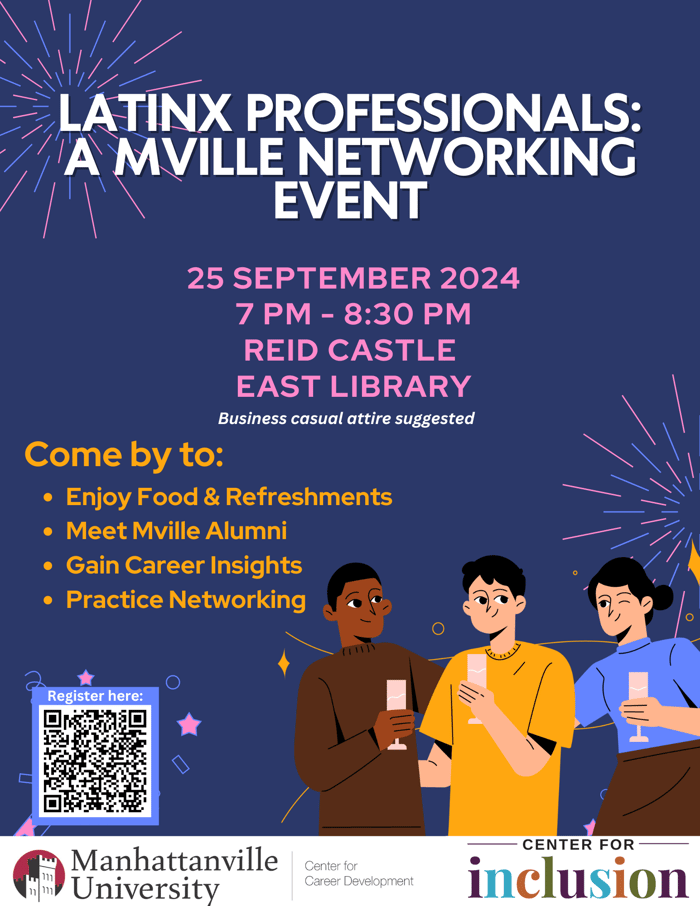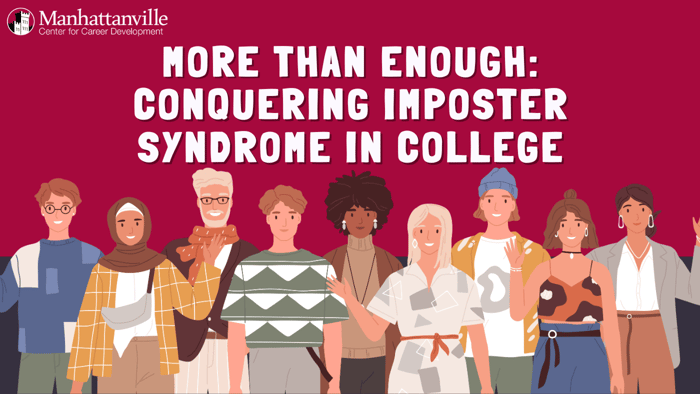What is "Imposter Syndrome?"
Have you ever felt like you don’t quite belong - whether in a classroom, at a networking event, or even at a social gathering? Like maybe you’re there by mistake, and everyone else has it all figured out? If so, you’re definitely not alone. Many students, regardless of their background, experience these feelings of doubt, especially when stepping into new or unfamiliar situations. For first-generation students or those from underrepresented communities, these feelings can be even more intense. This is called Imposter Syndrome or Imposter Phenomenon - that nagging voice telling you you’re not enough or that you don’t belong.
Students wrestling with Imposter Syndrome can face extra challenges as they work to reach their academic and career goals. It's important to recognize that it can make navigating college life and career decisions feel even more overwhelming that it naturally is. But it doesn’t have to be that way. Let’s take a closer look at Imposter Syndrome and explore strategies to help you move past it, or through it, with confidence.
Recognizing the Signs
Imposter Syndrome can show up in different ways, and many students experience it in their own unique form. Here are just a few of the ways students have described these feelings:
Doubting Your Abilities After Feedback
Some students share that when they receive critical feedback on an assignment, they immediately question whether they belong in college. “I didn’t understand what the professor was asking me to fix, and my first thought was, ‘I’m not smart enough to be here.’”Comparing Yourself to Classmates’ Success
Others express that seeing classmates excel (whether through internships, grades, or connections) can make them feel inadequate. “I’d think, ‘They’ve got it all together; I’ll never be on their level,’ and it made me question whether I was in the right place.”Not Speaking Up in Discussions
Many students hesitate to speak up during class discussions, even when they have ideas. “I’d have something to say but then second-guess myself, thinking my point wouldn’t be as insightful as others’. So I’d stay quiet and feel invisible.”Being the Only One in the Room Who Looks Like You
For some students from underrepresented backgrounds, being the only person of color in a class or at an event can amplify feelings of isolation. “I’m hyper-aware of being different, and it makes me feel like I have to prove that I belong here.”Discounting Achievements
Some students struggle to take pride in their accomplishments, even when they’ve earned them. “I’d get good grades or recognition, but instead of feeling proud, I’d think, ‘I just got lucky,’ like I didn’t really earn it.”
It’s easy to misinterpret moments of doubt or comparison as proof that you don’t measure up. But feeling unsure is a normal part of the learning process. These moments aren’t evidence that you don’t belong, they’re just part of growing.
Strategies to Overcome Imposter Syndrome
Here are some ways to confront Imposter Syndrome and regain or build up your confidence:
Ask Questions
Don’t be afraid to ask for help. Seeking clarification from professors or peers isn’t a sign of weakness; it’s how you grow. The more you ask, the more you’ll understand, and soon you’ll realize that everyone is figuring things out, just like you.Release the Pressure to Be Perfect
Perfection isn’t the goal - progress is. It’s easy to feel overwhelmed, especially if you’re balancing academic pressures with the expectations of being the first in your family to attend college. But remember, you don’t have to carry the weight of everyone’s expectations. Focus on your own growth and what you’re learning along the way.Find Your Support System
Connect with others who understand your experience. Whether it’s a study group, student organization, or a trusted mentor, building a supportive network can make a huge difference. Knowing you’re not alone in feeling this way can help ease those feelings of isolation.
Moving Forward: Beyond Just You
Imposter Syndrome doesn’t exist in a vacuum. While it’s important to recognize and manage these feelings, we also need to look beyond individual experiences and examine the systems that contribute to them. In the opening of this blog, you'll see I also tagged it as Imposter Phenomenon. Many folks argue that labeling these feelings as a "syndrome" overlooks the deeper issues such as systemic racism, classism, and bias that disproportionately impact marginalized communities, and also risks conflating this common experience with a diagnosable mental health condition. Click here to read Tulshyan & Burey's article in the Harvard Business Review. Historically, this concept didn’t take into account how these larger issues shape feelings of doubt, especially for students from underrepresented backgrounds.
It’s not just about overcoming personal self-doubt. What if the real issue is that many environments don’t fully reflect the diversity of leadership styles, backgrounds, and experiences? Instead of focusing solely on “fixing” individuals, we need to work toward creating spaces where everyone feels they belong, where different races, ethnicities, genders, and approaches to leadership are seen as just as valid and professional as the "traditional" models.
So, as you navigate Imposter Syndrome, remember that it’s not only about what you can do to manage these feelings. It’s also about changing the environments you’re part of. Surround yourself with support, ask for help when you need it, and trust that you’ve earned your place.
Come Practice Your Networking in a Space Meant for YOU

How the Center for Career Development Can Help Moving Forward
At Manhattanville University’s Center for Career Development (CCD), we use models like Life Design to help students overcome challenges like Imposter Syndrome. The Life Design model encourages students to approach their careers with curiosity and flexibility, helping them view uncertainty not as a failure, but as an opportunity for growth. This perspective directly counters the paralyzing effects of Imposter Syndrome, where students often feel they need to have everything figured out. By embracing a design-thinking approach, students can experiment with different career paths, learn from experiences, and iterate on their personal and professional goals without the fear of "getting it wrong."
At the CCD, we offer individualized counseling, workshops, and assistance finding hands-on experiences to help students discover their strengths, navigate their career paths, and feel more confident about their futures. Our resources help students build confidence by actively shaping their career journeys. By building a support system and embracing the mindset of continuous learning and growing, students can see their unique experiences and backgrounds as strengths that contribute to their career success.
For more details on how we support students, you can explore the CCD's offerings here.




